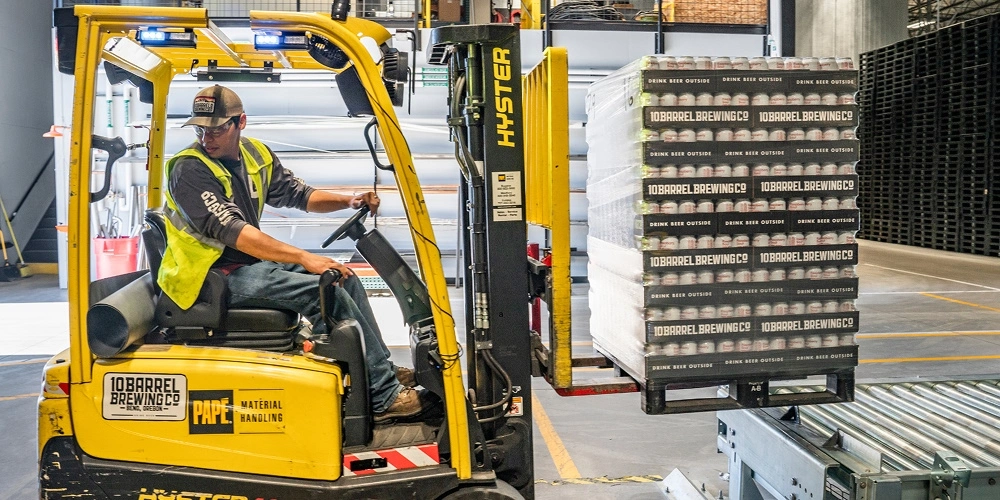Table of Contents
- 1. Start with a Comprehensive Risk Assessment
- 2. Diversify Your Transportation and Supplier Network
- 3. Invest in Real-Time Tracking and Software Solutions
- 4. Use Specialized Freight Protection for Sensitive Cargo
- 5. Create a Risk-Aware Culture Among Staff and Partners
- 6. Review and Update Your Risk Management Plan Regularly
- 7. Stay Compliant with Shipping Regulations
- 8. Partner with a Specialized Logistics Provider
- Ensure Comprehensive Freight Risk Management with Brew Movers
Join our
Mailing List
Stay up-to-date with BREW MOVERS latest news and service offerings.

Eight Freight Risk Management Strategies
Published Date: 09 April 2025
Logistics is fast-paced and increasingly complex. If you’re running a beverage or packaged goods company, you’ve likely realized that freight risk management is no longer a “nice-to-have” but a necessity.
Whether you’re shipping beer tanks across state lines or transporting raw ingredients for a new kombucha batch, understanding the risks tied to your cargo is critical for maintaining business continuity, regulatory compliance, and, ultimately, customer satisfaction.
At Brew Movers, we specialize in logistics risk management for the craft beverage industry, so we’ve seen firsthand how supply chain disruptions can impact every link in the chain, from the harvest of hops to the final delivery at a distributor’s warehouse.
Below, we break down our top eight strategies to help you mitigate risks, strengthen your supply chain risk management plan, and safeguard your shipments from unexpected setbacks.
1. Start with a Comprehensive Risk Assessment
Before tackling potential threats, you need to know what you’re up against. A comprehensive risk assessment evaluates every part of your logistics operations—from internal risk factors like outdated tech systems to external risks like natural disasters or geopolitical risks.
To do risk assessment, map out your entire supply chain and identify vulnerabilities. This includes raw material sourcing, transportation providers, warehouse storage, and end-point delivery. Think of it as the blueprint for building a bulletproof risk management process.
2. Diversify Your Transportation and Supplier Network
Putting all your (freight) eggs in one basket? Risky move. One delayed truck, supplier shutdown, or missed customs declaration could throw off your supply chain efficiency and operations for weeks. By diversifying your third-party vendors, carriers, and supplier risk management relationships, you reduce your exposure to potential disruptions.
At Brew Movers, we maintain a trusted carrier network across North America. If one option’s compromised, we have a backup ready to go. This built-in flexibility is essential to any strong logistics risk management strategy.

Image Source: Canva
3. Invest in Real-Time Tracking and Software Solutions
One of the most effective risk mitigation strategies today is investing in software solutions that give you full visibility over your freight. From GPS-enabled tracking systems to automated alerts, real-time data enables the continuous monitoring of shipments, allowing you to respond quickly to unforeseen events.
Plus, when issues arise, you’re equipped to perform root cause analysis based on real data. This not only helps in addressing risks but also improves your transportation management over time.
4. Use Specialized Freight Protection for Sensitive Cargo
If you’re shipping temperature-sensitive goods like beer, wine, spirits, or perishable ingredients, cold chain shipping and protective packaging aren’t optional—they’re non-negotiable.
That’s where our proprietary Pallet Parka comes in. It’s designed to maintain product integrity without relying on refrigerated trucks, cutting costs while keeping shipments safe. Whether you’re concerned about environmental risks, operational risks, or just a spike in summer heat, solutions like this are key in cargo risk management.
5. Create a Risk-Aware Culture Among Staff and Partners
Technology and strategy only go so far without people to back them up. Building a risk-aware culture means training your staff and working with partners who understand the importance of risk identification and mitigation.
This includes setting key performance indicators, establishing a clear escalation process for incidents, and ensuring everyone involved in your logistics operations is aligned on contingency planning. It’s about turning risk management in logistics from a reactive process into a proactive one.
6. Review and Update Your Risk Management Plan Regularly
The world of global trade and international logistics is constantly evolving. What worked last year may not cut it today. That’s why a comprehensive risk management plan must be a living document—reviewed and revised quarterly or after any major risk event.
Ask yourself: Have we introduced any new suppliers? Expanded into new markets like wine or cider? Changed carriers? Each of these shifts introduces new risk factors. By revisiting your supply chain risk assessment regularly, you can stay ahead of potential risks and maintain a strong competitive advantage.

Source: Canva
7. Stay Compliant with Shipping Regulations
Shipping risk compliance is often overlooked until it’s too late. But failing to comply with local, national, or international regulations can lead to fines, delays, or even the seizure of your cargo.
Here at Brew Movers, we help clients navigate transportation risk management by ensuring all documentation, labeling, and transport methods are in full regulatory compliance. Whether it’s alcohol-specific rules or general shipping guidelines, staying compliant is vital to effective risk management strategies.
8. Partner with a Specialized Logistics Provider
Finally, the best way to reduce headaches is to partner with a logistics company that understands your industry. A specialized logistics provider—like Brew Movers—understands the unique challenges of shipping beer, beverage equipment, and ingredients, and already has systems in place to minimize disruptions.
From dry ingredient shipping to festival logistics, we’ve helped craft beverage producers across North America streamline their operations and manage risk confidently.
Ensure Comprehensive Freight Risk Management with Brew Movers
Whether you’re a startup brewery or an established distributor, freight risk management is essential to ensure your products reach their destination on time, in good condition, and without unexpected setbacks. From real-time tracking and risk mitigation strategies to building strong supplier networks, these tools can help future-proof your logistics operation.
At Brew Movers, we take the guesswork out of cargo risk management and help you build a shipping strategy that works. Reach out today to learn how our transportation risk management solutions can support your team and protect your product—because in today’s world, smart risk management in logistics isn’t optional.
Contact us now to make your freight plan airtight!
.single-wraper a span {font-weight: 600 !important;}




